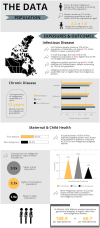Inequities in Canadian maternal-child healthcare are perpetuating the intergenerational effects of colonization for indigenous women and children
- PMID: 40535705
- PMCID: PMC12174450
- DOI: 10.3389/fgwh.2025.1513145
Inequities in Canadian maternal-child healthcare are perpetuating the intergenerational effects of colonization for indigenous women and children
Abstract
Universal, publicly funded healthcare has long been a point of pride for Canada, despite decades of data contradicting its universality and accessibility. Inequities in access to and provision of healthcare services are particularly evident in the direct comparison of health outcomes between Indigenous (First Nations, Inuit, and Métis) and non-Indigenous populations in Canada. Globally, there are data to support similar disparities in maternal-child health for Indigenous populations around the world. Here, we describe how these inequities uniquely impact people at the intersection of multiple vulnerabilities-Indigenous pregnant women and their children. Indigenous pregnant women in Canada are far more likely to have experienced harmful in utero exposures, inadequate antenatal care, and adverse birth outcomes than non-Indigenous pregnant women. These inequities in maternal-child health may be contributing to biological processes (e.g., epigenetic reprogramming) with intergenerational consequences for chronic disease risk in Indigenous populations. We highlight how the current state of maternal-child health for Indigenous women in Canada is likely perpetuating the multigenerational cycle of oppression triggered by the process of colonization. Finally, we outline current efforts to achieve reproductive justice, decolonize maternal-child health in Canada, and reclaim childbirth by Indigenous communities and their allies. We recognize the strength and resilience of Indigenous women in Canada to resist the persistence of colonial ideals in birthing rights and practices.
Keywords: decolonization; indigenous; intergenerational; maternal-child health; reproductive justice.
© 2025 Weckman and Farrugia.
Conflict of interest statement
The authors declare that the research was conducted in the absence of any commercial or financial relationships that could be construed as a potential conflict of interest.
Figures

References
-
- Garner R, Carrière G, Sanmartin C, Longitudinal Health and Administrative Data Research Team. The Health of First Nations Living Off-Reserve, Inuit, and Métis Adults in Canada: The Impact of Socio-economic Status on Inequalities in Health. Ottawa: Statistics Canada; (2010). (Health Research Working Paper Series).
-
- Public Health Agency of Canada. Key Health Inequalities in Canada: A National Portrait. Ottawa: Public Health Agency of Canada; (2018).
-
- Sheppard AJ, Shapiro GD, Bushnik T, Wilkins R, Perry S, Kaufman JS, et al. Birth outcomes among first nations, inuit and métis populations. Health Rep. (2017) 28(11):11–6. - PubMed
LinkOut - more resources
Full Text Sources

